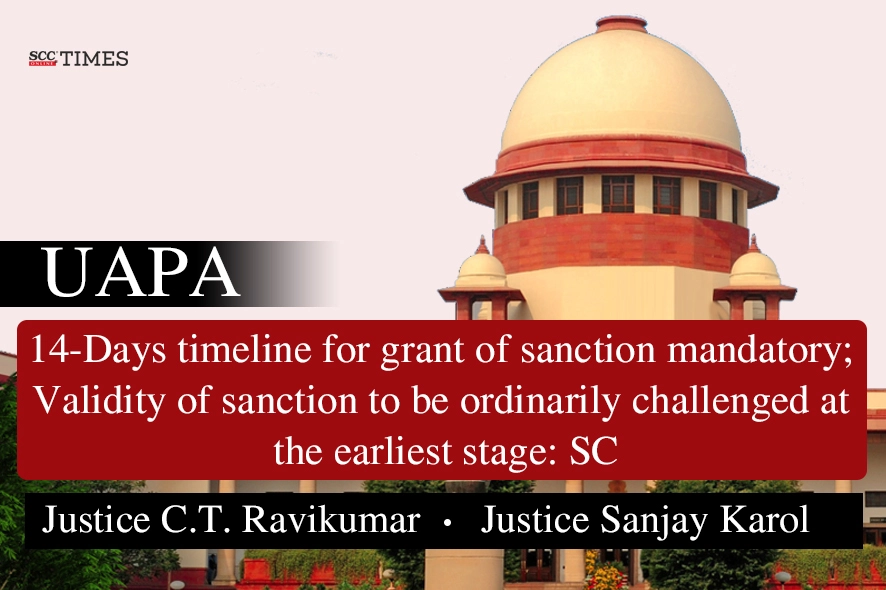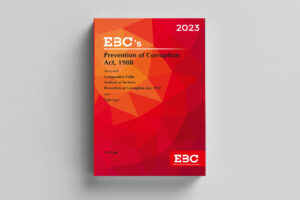Supreme Court: Deciding the issues relating to the stage for challenging the validity of sanction under the Unlawful Activities (Prevention) Act, 1967 (‘UAPA’), the bench of CT Ravikumar and Sanjay Karol, JJ held that the validity of sanction should be challenged at the earliest instance available, before the Trial Court. The Court further explained that if such a challenge is raised at an appellate stage it would be for the person raising the challenge to justify the reasons for bringing the same at a belated stage. Such reasons would have to be considered independently so as to ensure that there is no misuse of the right of challenge with the aim to stall or delay proceedings.
The Court also held that the timelines mentioned in Rules 3 & 4 of the Unlawful Activities (Prevention) (Recommendation & Sanction of Prosecution) Rules, 2008 (‘2008 Rules’) are couched in mandatory language and, therefore, have to be strictly followed. The Court, however, clarified that the observations made in this judgment shall apply prospectively.
Challenge to validity of sanction — at what stage?
In order to decide the issue, the Court considered a number of authorities that generally pointed to only one conclusion that sanction, though should be challenged at the earliest possible opportunity, it can be challenged at a later stage as well. It is to be noted that these judgments were not specifically in the context of laws such as UAPA.
Drawing comparison, the Court noted that other legislations such as the Criminal Procedure Code, 1973 and the Prevention of Corruption Act, 1988 provide mechanisms for the sanction and subsequent actions to be saved from being invalidated due to any irregularity etc. However, the UAPA does not provide for any such saving of the sanction. Hence, the Court noted that, in the wisdom of the legislature, the inbuilt mechanism of the Act of having two authorities apply their mind to the grant of a sanction, is sufficient. This emphasizes the role and sanctity of the operation to be carried out by both these authorities.
The Court explained that in order to challenge the grant of sanction as invalid, the illustrative grounds that can be urged are:
(1) all the relevant material was not placed before the authority;
(2) the authority has not applied its mind to the said material; and
(3) insufficiency of material.
It could be seen that the common thread that runs through the three grounds of challenge above is that the party putting forward this challenge has to lead evidence to such effect. That, needless to say, can only be done before the Trial Court. Hence, while recognising the “treasured” right of an accused to avail all remedies available to him under law, the Court held that in ordinary circumstances challenge to sanction under UAPA should be raised at the earliest possible opportunity so as to enable the Trial Court to determine the question, for its competence to proceed further and the basis on which any other proceeding on the appellate side would depend on the answer to this question.
Whether violation of – (a) statutory timelines and (b) the requirement of independent review which includes application of mind, are necessary aspects of procedure without which, any transaction under the UAPA shall be compromised to a point that its sanctity is rendered questionable?
Keeping in view that UAPA being a penal legislation, strict construction must be accorded to it, the Court clarified that the timelines mentioned in Rules 3 & 4 of the Unlawful Activities (Prevention) (Recommendation & Sanction of Prosecution) Rules, 2008 (‘2008 Rules’) are couched in mandatory language and, therefore, have to be strictly followed. The Court, however, clarified that the observations made in this judgment shall apply prospectively. The Rules provide a seven-day period within which the concerned authority is to make its recommendation on the basis of materials gathered by the investigating officer and a further seven days period for the government to grant sanction for prosecution, having considered the report of the authority.
“Timelines imposed by way of statutory Rules are a way to keep a check on executive power which is a necessary position to protect the rights of accused persons. Independent review by both the authority recommending sanction and the authority granting sanction, are necessary aspects of compliance with Section 45 of the UAPA.”
Explaining the importance of timelines in statutory framework, the Court observed that they extremely essential to an effective, efficient and focused machinery of criminal investigation, prosecution and trial. They are the essential aspects of right to speedy trial, which is enshrined under Article 21 of the Constitution of India.
Talking about penal laws such as UAPA or the Terrorist and Disruptive Activities (Prevention) Act, 1987, the Court said that the grant/non-grant of sanction is what sets in motion the machinery. Given the severity of these laws and the nature of activities with which they are associated, the effect that they have on the person accused thereunder is not only within the realm of law but also drastically effects social and personal life. It is only after the authority having been handed this task, is of the considered view that sanction can be granted, should it be so done. Hence, the procedures qua sanctions provided in such legislations are meant to be followed strictly, to the letter more so to the spirit. Even the slightest of variation from the written word may render the proceedings arising therefrom to be cast in doubt.
Coming specifically to the procedure for sanction provided under the UAPA, the Court found that a Court is enjoined from taking cognizance without previous sanction either by the Central Government or the State Government, as applicable, and such sanction shall only be given after the report of the authority appointed by the Central Government or the State Government, as the case may be, has been considered. This authority is to make an independent review of the evidence gathered and make a recommendation to the government within a time bound manner. One week’s time, given to both the authorities is to enable them to independently evaluate, first the materials placed on record then recommend the grant of sanction; and second, to evaluate the material and the recommendation so made above, to finally ink the order of sanction.
Answering what happens when the time so granted is thoroughly under-utilised or if either of the two authorities overshoot the time, as stipulated in the rules, the Court held that Rules made by virtue of statutory powers prescribe both a mandate and a time limit and the same has to be followed. The Court observed that when a timeline is provided, along with the use of the word ‘shall’ and particularly when the same is in the context of a law such as the UAPA, it cannot be considered a mere technicality or formality. It demonstrates clear intention on the part of the Legislature. The Court explained that the time granted is only for consideration of the material collected by way of an independent review and then making a recommendation where after the sanctioning authority may then consider the materials as well as recommendation to finally, grant or deny the sanction. It is not for the purpose of the investigation itself, which understandably can be a time-consuming process, given the multiple variables involved.
“There have to be certain limitations within which administrative authorities of the Government can exercise their powers. Without such limitations, power will enter the realm of the unbridled, which needless to state is, antithetical to a democratic society. Timelines in such cases, serve as essential aspects of checks and balances and of course, are unquestionably important.”
Independent Review
On the question as to what can be considered as an “independent review” in the context of UAPA, the Court explained that independent review as well as application of mind are questions to be determined by way of evidence and as such should be raised at the stage of trial, so as to ensure that there is no undue delay in the proceedings reaching their logical and lawful conclusion on these grounds. An order passed by an administrative authority is not to be tested by way of judicial review on the same anvil as a judicial or quasi-judicial order. While it is imperative for the latter to record reasons for arriving at a particular decision, for the former it is sufficient to show that the authority passing such order applied its mind to the relevant facts and materials.
CASE DETAILS
|
Citation: Appellants : Respondents : |
Advocates who appeared in this case For Petitioner(s): For Respondent(s): |
CORAM :







